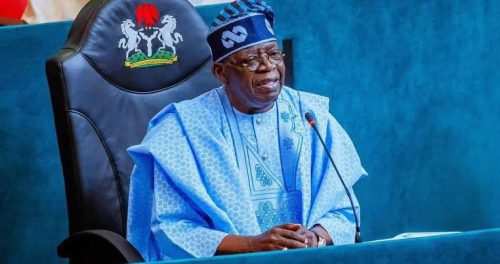NATIONAL NEWS
FG Unveils Incentives for Oil and Gas Production, Assures Commitment to Reform
In a major move to advance ongoing structural reforms in Nigeria’s oil and gas industry, President Bola Tinubu has approved the issuance of two new sets of fiscal incentives: a VAT waiver covering gas, diesel, electric vehicles and clean cooking equipment, and tax credits for new investments in the exploration and production of deepwater oil and gas.

PRESS RELEASE | OFFICE OF THE SPECIAL ADVISER TO THE PRESIDENT OF NIGERIA ON ENERGY
In a major move to advance ongoing structural reforms in Nigeria’s oil and gas industry, President Bola Tinubu has approved the issuance of two new sets of fiscal incentives: a VAT waiver covering gas, diesel, electric vehicles and clean cooking equipment, and tax credits for new investments in the exploration and production of deepwater oil and gas.
The new fiscal incentives, expected to take effect immediately, are contained in the following documents issued by the Honourable Minister of Finance and Coordinating Minister of the Economy, Wale Edun:
· Value Added Tax (VAT) Modification Order 2024
· Notice of Tax Incentives for Deep Offshore Oil & Gas Production in line with the Oil & Gas Companies (Tax Incentives, Exemption, Remission, etc.) Order 2024.
The VAT Modification Order formalizes a 2023 waiver on value-added tax (VAT) on the sale of petroleum products including feed gas, liquefied petroleum gas (LPG), compressed natural gas (CNG) and associated equipment, as well as electric vehicles and diesel, and additionally extend the VAT waivers to cover liquefied natural gas (LNG) and clean cooking equipment.
The Notice of Tax Incentives builds on a directive issued by President Tinubu in February 2024, which, in addition to providing incentives for onshore oil and gas investments, specifically authorize the Minister of Finance to introduce additional fiscal incentives to support investments in deep offshore oil and gas.
This is the first time that Nigeria is outlining a fiscal framework for deepwater gas since basin exploration commenced in 1991.

The incentives are in alignment with the Presidential Gas for Growth Initiative, which aims to fast-track the development of natural gas, displace fossil fuels in transport, promote affordability of gas, and bolster the country’s energy security.
Despite the intensifying urgency of the global energy transition, an estimated seventy-six percent of Nigeria’s gas remains undeveloped.
Mrs. Olu Verheijen, Special Adviser to the President on Energy and head of the Energy Office of the Presidency, who is coordinating the rollout of the reforms, said: “Since Nigeria’s last deepwater project – the Egina project – was approved in 2013, International Oil Companies operating in Nigeria have committed more than $82 billion in deepwater investments to other countries that they deem more competitive. Over the next few years, they plan to spend another $90 billion to develop deepwater oil and gas projects. This is the pool of funds that our reforms are targeting, and we intend to unlock between $5 billion to $10 billion of new investments in Nigeria in the near- to medium-term.”
Since President Tinubu assumed office in May 2023, the government of Nigeria has embarked on a series of new reforms to improve the competitiveness of its oil and gas industry and bring down the costs and timelines of doing business in a sector that continues to be the biggest earner of foreign exchange for the country.
These reforms, which include three presidential directives issued in February 2024, will create tens of thousands of new jobs, improve foreign exchange earnings, stimulate tax revenues and contribute to Nigeria’s macroeconomic stability.
Commenting, the Chairman of the Oil Producers Trade Section, Osagie Okunbor, said: “The level of coordination and policy coherence we’re seeing today is unprecedented. The accelerated pace of reforms over the past year has renewed our interest in Nigeria.”
Rosario Osobase, Chairperson of the Petroleum Contractors Trade Section, another industry group, said, “For the first time in a long while, we’re seeing positive momentum in our industry in Nigeria, thanks to the Presidential Directives and the government’s deliberate efforts to engage the service sector.”
Morenike Adewunmi
Stakeholder Manager
Office of the Special Adviser to the President on Energy
Abuja, Nigeria
03 October 2024
For publication of your news content, articles, videos or any other news worthy materials, please send to newsleverage1@gmail.com. For more enquiry, please call +234-706-806-4347 or whatsapp +234-706-806-4347. To place an advert, please call 07068064347.
-

 METRO2 weeks ago
METRO2 weeks agoDebtors Rejoice Over Death of Popular Money Lender, ‘Old Warri’
-

 CRIME3 weeks ago
CRIME3 weeks agoPolice Crack Down on IPOB/ESN, Kidnapping Gangs, Arrest Over 2,700 Suspects
-

 NATIONAL NEWS4 weeks ago
NATIONAL NEWS4 weeks agoBreaking! FG Declares Tuesday Public Holiday
-

 NATIONAL NEWS7 days ago
NATIONAL NEWS7 days agoAdeyanju Reveals Who Funds Atiku’s Presidential Bid
-

 Abia State News2 weeks ago
Abia State News2 weeks agoEze Eberechukwu Oji Establishes Four Development Committees

